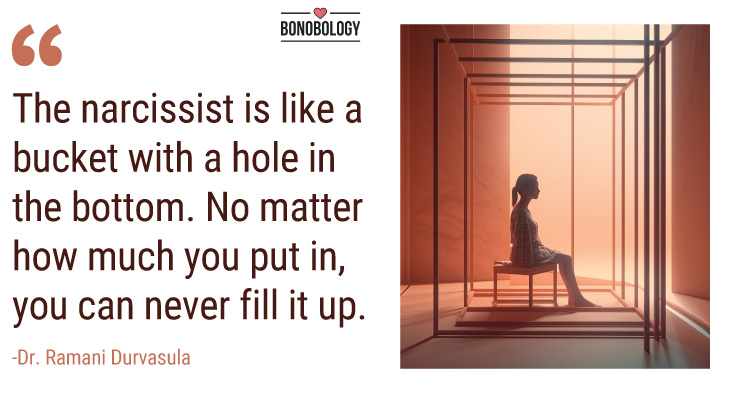Every marriage has its ups and downs, but when you have got a narcissistic husband or wife, you may end up feeling invisible in the relationship and the “ups” might be few and far between. Given that a narcissistic person is often in denial about their reality and stubbornly resistant to making amends, having a functional relationship with them is near impossible. However, if for some reason walking away is not an option for you, learning how to deal with a narcissist spouse might perhaps just help you turn it into a workable union — as much as possible.
Yes, being married to a narcissist can be excruciatingly painful. Their lack of empathy might baffle you. You’ll have the same fights over and over again, and you will always find yourself at the receiving end of blame and accusations. Nothing you do is ever good enough, you’re always reminded of the many ways you fall short. All you want is a little consideration but that is the one thing they’re not capable of offering. And when the next fight rolls around because you didn’t pay “enough attention” to them, the cycle will start again. That’s just the pattern of narcissistic relationships.
When the bickering and glaring inconsideration get too much to handle, you might just end up feeling helpless, trapped even. So how do you deal with all of it without letting it turn into comorbid psychological distress? With the help of clinical psychologist Devaleena Ghosh (M.Res, Manchester University), founder of Kornash: The Lifestyle Management School, who specializes in couple counseling and family therapy, let’s help you figure out how to deal with a narcissist spouse so you don’t end up feeling like there’s no way out.
What Is Narcissistic Personality Disorder?
Table of Contents
To be able to understand how to deal with a narcissist spouse, you first need an insight into the way their mind functions and why, and how it manifests in their behavior in relationships. To that end, let’s first take a look at what is narcissistic personality disorder.
Narcissistic personality disorder is a mental health condition where the affected person has an inflated sense of self or an unreasonably high view of their own importance. This is coupled with an absolute lack of empathy, which results in an inability to care about or understand other people’s feelings. These two aspects combined may result in narcissists displaying extremely selfish behavior in their relationships.
Devaleena explains, “Narcissistic people have an intense need for admiration and attention and may feel disappointed or unhappy when they’re denied this admiration or special treatment. This may result in them feeling unfulfilled or unsatisfied in their relationships.”
According to research, narcissistic personality disorder affects up to 6.2%. of the population and is slightly more prevalent in men. The negative behavior stemming from narcissistic tendencies affects almost every aspect of a person’s life, be it professional or personal. However, it’s perhaps most strongly felt in their intimate, romantic connections where their partner finds themselves at the receiving end of abusive behavior in varying degrees, shades, or intensity.
To understand a narcissistic personality in its entirety, it’s also important to get to the root cause of this behavior pattern. Explaining the origins of narcissistic behavior, Devaleena says, “These people appear extremely confident, however, that confidence and self-assuredness is nothing but a mask to hide their low self-esteem and insecurity. This low sense of self-worth is often rooted either in childhood trauma of emotional neglect or even emotional abuse, or an extremely shielded upbringing that makes a person believe that they’re entitled to get whatever they want.”
Does any of it sound relatable or true of your spouse? If so, you may notice the following narcissistic traits in them:
- An inflated sense of self
- A heightened need for attention
- Thriving on admiration
- Total lack of empathy
- A sense of being superior to others
- Entitled behavior
- Inability to deal with others’ success
- Jealous behavior
- Attaching undue importance to notions of beauty, power, brilliance, success
- A sense of vanity
- Trouble maintaining long-term intimate relationships
Now, it’s important to bear in mind that like any other mental health condition, narcissistic personality disorder cannot be characterized in absolutes. It usually operates on a broad spectrum, and there is a good chance that even if you have a narcissistic husband or wife, he/she may not display all of these behavior traits. Confused? Let’s look at some of the clear signs of a narcissistic partner to help you gain more clarity on the issue.
Related Reading: 20 Signs You Are In An Emotionally Abusive Relationship
5 Sure-Shot Signs You Have A Narcissist Spouse
Though it may seem like we’re all married to the most selfish person to have ever existed, a misdiagnosis of narcissism can be almost as fatal as not attending to it. Not all self-centered behavior amounts to narcissism. Narcissistic personality has some key defining factors. It’s important to understand them and assess whether you see them in your partner before you convince yourself that you have a narcissistic wife or husband.
So before we get into how to deal with a narcissist spouse, let’s take a look at the classic signs of narcissistic tendencies so that you know what you’re dealing with:
1. They can do no wrong
“The first thing to consider in a narcissistic spouse is that they never take responsibility for their actions, they’re always right. There’s always a lot of blame-shifting in the relationship since they can’t accept losing an argument,” says Devaleena.
If you’re upset with your partner because they haven’t talked to you in weeks, it’s your fault because you “didn’t make an effort”. If they forget the car keys on their way out, it’s your fault because you didn’t remind them. One of the most common narcissistic marriage problems is the fact that such a lack of responsibility always leads to constant bickering.
Related Reading: How To Make A Narcissist Miserable – 13 Things To Do
2. They have a grandiose idea of self-importance
“A narcissistic person has a peculiar sense of entitlement and believes that the world owes them something. It can also come as a disguise where they oscillate between blatant self-importance and victim-playing when they think they’re helpless souls who have got a raw deal in life. It then becomes the moral duty of the people around them to cater to whatever is not going well in their lives. And if you don’t cater to their needs, you are one among those who have wronged them,” says Devaleena.
This vulnerable narcissist ruse is nothing but a way for them to draw the spotlight back on them. Whether your narcissistic partner is playing up their larger-than-life perception of the self or acting like the victim, you will invariably be pushed into the background. The partner feeling unseen, unheard, or downright invisible, is a common pattern in narcissistic relationships.
3. You’re constantly reassuring them of how great they are
“They need praise, admiration, and adoration from their spouses all the time. They have to constantly hear how great they are at everything that they do. They fish for compliments every chance they get. To them, words of affirmation aren’t just a sweet gesture, it’s the only acceptable form of communication,” says Devaleena.
If you don’t congratulate them on something they did at work at least half a dozen times, they’re going to get upset about it. If you don’t tell them how much you love them and why thrice a day, they’re going to think you don’t. As you can probably tell by now, understanding how to deal with a narcissist spouse isn’t that easy as they’re nearly incapable of building and maintaining healthy relationships.
4. They’re always expecting special treatment, no matter where they are
“It doesn’t matter where they are, they expect special treatment everywhere. And if they’re not given this special care and attention, they’re going to want to leave or throw a fit the entire time. Even if it’s important to you, they won’t consider staying because they’re not treated the way they think they should be,” says Devaleena.
It doesn’t matter if they’re meeting your friends, people they’ve never met before, or even if they’re in a new country. If they’re not the center of attention or if their made-up “needs” aren’t being cared for, they’re already upset. Of course, at the root of it all is a fragile self-esteem that constantly needs to be bolstered by people around them, but constantly pandering to their needs can make it hard to empathize with your narcissistic partner’s inner turmoil or even understand where they’re coming from.
Related Reading: 4 Signs Of An Unequal Relationship And 7 Expert Tips To Foster Equality In A Relationship
5. They can’t stop talking about their achievements (which they exaggerate)
“A telling characteristic of grandiose narcissism is the tendency to exaggerate achievements and talents. A narcissistic husband or wife may expect you to constantly hear them bragging about things they may have done. It doesn’t matter if decades have passed; they’re going to repeat the story every chance they get. They’ll expect their spouses to agree with them and offer praise all over again.
“If you don’t, they get offended. And since they have no understanding of healthy conflict resolution strategies, the fights get nasty. Narcissists often react to criticism very badly. They’re absolutely closed to any kind of criticism, even if it’s the most constructive one. That’s because they think they’re always right and superior to you,” says Devaleena.
If you’re living with a narcissist, you’ve probably heard the same old stories of their triumphs over and over again. God forbid, you say something like, “I know, you’ve told me before” because it’s not going to end well for you. From verbal abuse to stonewalling and silent treatment, they’ll come at you with every weapon in their arsenal.
Now that you know what the classic signs of someone with NPD look like, it’s time to figure out how to stay in a marriage that has made you pull your hair out. Don’t worry, these expert tips will make sure you don’t end up going bald.

9 Expert Tips On How To Deal With A Narcissist Spouse
Living with a narcissistic wife or husband when leaving is not an option does not mean you’re not doomed to a life of invalidation and belittlement. While their victim-playing attitude may make them believe they’ve been dealt a rough hand in life, it’s actually you who’s got to bear the brunt. Putting up with narcissistic abuse (and yes, such relationships almost always turn abusive) can take a massive toll on your own emotions, mental health, and sense of self.
When you’re constantly derided, subjected to manipulative behavior like narcissistic gaslighting or stonewalling, told you’re not good enough, and are left to walk on eggshells around your partner, your self-esteem and confidence can hit rock bottom and you may be left to grapple with issues like anxiety or post-traumatic stress. However, it’s in your hands to prioritize self-preservation and not let comorbid psychological distress take a toll.
Unlike your narcissistic spouse, you can’t just sit around and complain about the injustice you’re facing. You need to take charge of the situation and find a way to protect yourself from the emotional damage your narcissistic husband/wife may cause you. We bring you a few expert-backed tips on how to deal with a narcissist spouse to help you get the most out of your marriage:
1. Tell your spouse how you feel
The narcissistic marriage problems will eat away at you and your spouse won’t even get to know about it unless you communicate your feelings to them. A narcissist doesn’t think about how his/her actions affect those around them or the fact that they may be annihilating their partner’s self-esteem. They’re not much bothered with the repercussions until they affect them as well. Chances are, your spouse is oblivious to the damage they’re causing to your mental health.
The first step toward safeguarding yourself from the emotional abuse that a narcissist may be subjecting you to is to speak up. In a non-hostile manner, try to put forth the things you have been feeling. Since you’re not dealing with the easiest person to talk to, you might have to assuage their ego a bit before you get into it. Let them know what bothers you and what you’d like to do differently. Here are some examples of how you can put your point across to your narcissistic wife/husband:
- I love you so much, but when you don’t listen to me, it makes me feel uncared for because…
- I love it when you share things with me, but I also want to tell you about what’s going on in my life. How about we set time apart to exchange stories about each other’s day
- I admire how passionate you’re about the things that matter to you, but when you lose your cool, it leaves me worried and scared.
- I think we should discuss our issues when we’re both in a calm state
Related Reading: 11 Tips To Deal With A Narcissist Boyfriend Smartly
2. Recognize the manipulation
“Narcissists are invariably great manipulators. Being married to one, you may have been successfully manipulated without even realizing it. Once you spot how this manipulative behavior works, there is a high chance of recovering from the effects of narcissism. But the catch here is to recognize how they weave their magic and put you under their spell,” says Devaleena.
To be able to spot narcissistic manipulation in your relationship, you need to start paying attention to the little things your spouse may do to exercise control over you and how you respond to these, for example:
- Do you fall for the victim card they end up using?
- Do you tend to give in to their incessant demands?
- Do you feel guilty about putting your own needs first?
- Do they make you doubt your own version of reality?
- Do you feel you can no longer tell right from wrong without your partner’s approval?
Once you can see through the manipulation and control tactics, you will realize that the foundation of your relationship is weak. As that realization sinks in, you will find it in yourself to break free from this cycle of narcissistic abuse.
3. Find your support system
When trying to figure out how to deal with a narcissist spouse, you need to pay attention to how you have been sidelining your needs and wants all along – much like your spouse wanted you to. A narcissistic partner thrives on isolating their significant other from their loved ones so that they can be the center of attention. It plays right into their self-centered tendencies.
Now that you can see through your partner’s narcissistic tendencies, know that you’re going to need all the support and strength you can gather to deal with it. So, begin by establishing healthy boundaries so that you can make room for other people in your life once again. “Build your support system, your cheering squad, your own pack. It’s almost a necessity to have people around you who you can trust when you’re experiencing narcissistic marriage problems,” says Devaleena.
Here are some ways you can start nurturing relationships that may have fallen on the way side and build your support system:
- Tell your partner, “You know how much I love spending time with you, but I also miss my friends and family. I’d like to set aside some time for them every week”
- Hit up your friends and family, and let them know much you’ve missed them and that your regret losing touch
- Irrespective of your spouse’s reaction (chances are they’ll sulk or throw a hissy fit), follow through on your plan to make time for friends and family
- Once you rebuild your bond with them, little by little, share your struggles with them and lean on them for emotional support
Related Reading: Healthy vs. Unhealthy Relationships – 10 Characteristics
4. Have realistic expectations
Though it’s only human nature to expect that things will get better sooner or later, it’s also important to understand that NPD is a mental condition that alters the way a person thinks and behaves, and expecting them to change overnight is only going to lead to heartache.
“It’s natural for anyone in a relationship to have a lot of expectations from their partner. But when you’re married to a narcissist, it is very important to learn how to manage your expectations. Don’t confuse a narcissistic spouse with someone who keeps their promises, this person is going to hurt you consistently, often without even realizing it,” says Devaleena.
When you’re dealing with a narcissistic husband/wife, you will need to change the way you talk around them, so that they don’t feel offended. However, it’s also important to note that you mustn’t give in to their demands. Though you must manage your expectations in this relationship, the only way to stay in the marriage is for both of you to work together to improve things. Here is what realistic expectations from a narcissistic partner may look like:
- Expect them to lash back at you and be unreasonable
- Expect them to hate you for suggesting a few changes
- Know that they may not be able to keep the promises they make to you
- Know that they will not make an effort to change unless their carefully created public image is threatened
- Expect abusive behavior and prepare yourself to deal with it by setting clear boundaries
- Expect them to walk all over you but learn to put your foot down and push back as subtly as possible

5. Accept their limitations and work around them
“If you are living with a narcissist when leaving is not an option, you need to understand the limitations of the other and work around them. Do not try to change them overnight or be hostile toward them for the things they say. In most cases, they will not cater to your considerations,” says Devaleena.
Do they get annoyed when people in a group don’t pay attention to them? Try to mention something they did recently, so people start talking to them. Are they hesitant to go to that play you’ve wanted to go to forever? Tell them how they’ll look like a better spouse since they’re doing something for you, hence showing them how this benefits them too.
Though it may seem unfair, you’ve got to accept this person’s limitations and work around them if you want there to be some peace in your house. If you’re constantly blaming them for the things they do wrong, since they lack empathy to see where you’re coming from, it’s only going to result in a screaming match.
Related Reading: 21 Ways To Tell You Have A Narcissistic Husband
6. Hold your ground, but pick your battles
“It’s very important to know which battles are worth fighting and which aren’t. If you are trying to fight with your narcissistic wife/husband to prove your point, you will end up being physically or emotionally wounded. It won’t do you and your family any good,” says Devaleena.
The key to figuring out how to deal with a narcissist spouse is knowing when to hold your ground and when to let your spouse get away with their behavior, no matter how appalling. Indulging in screaming matches over every little thing will only lead to resentment in the marriage without helping you resolve any issues. Sometimes you can choose to walk away or ignore the accusations when you’re fighting over something petty, like that time you didn’t praise them enough for something they did.
But when a fight breaks out about something important like your child, your self-esteem, or your financial security, you must stand your ground. You might be tempted to assume blame to reinstate peace in the house, but that way, you’ll just be encouraging them to disrespect you in the future. If you don’t want to leave a narcissist spouse, you’ve got to let them know that you will not let them walk all over you.
7. Let them know what’s okay and what isn’t
“To be able to set healthy boundaries, you must establish with yourself what’s acceptable and what isn’t with regard to how other people treat you. How much disrespect is too much? Where do you draw the line? The sooner you answer these questions yourself, the sooner you’ll be able to communicate it,” says Devaleena.
A narcissistic spouse doesn’t value your personal space and privacy. They may feel entitled to tell you what to think or what to do since it meets their whims and fancies. They may go through your phone, take you for granted, and may not care much about the personal space you asked for. Since they have no sense of boundaries, it’s important to let them know what’s okay and what isn’t. Here are some examples of how you can draw a line in the sand with your narcissistic partner:
- When you go through my phone, it makes me feel like you don’t trust me. I expect you to not do that
- anymore
- I want to spend the weekend with my friends
- I would like equal access to our joint account, without it I feel financially insecure
- It’s hurtful when you mock me in front of our friends/children/family. I will no longer engage in such conversations
Related Reading: 13 Ways To Make Him Realize Your Worth
8. Work on your self-confidence and self-worth
When you’re living with a narcissist, the constant verbal abuse, silent treatment, or name-calling in the relationship might eat away at your confidence. Don’t let their grandiose idea of self-importance fool you into thinking that they are superior to you. Remind yourself that this perception is a creation of your partner’s narcissistic personality and has nothing to do with facts or reality. You can use positive affirmations to counter the manipulative behavior and emotional abuse you’re being subjected to. Here are some examples:
- When your partner gaslights you, tell yourself, “I know what happened, I know my reality. My partner is lying to me”
- When your partner belittles you, tell yourself, “I am beautiful/capable/strong” (or whatever else they’re attacking you about)
- When your partner lashes out, tell yourself, “I will not stoop down to his/her level. I’m better than this”
- When you work on your confidence and self-worth, you’d better be able to hold your own during ugly confrontations.
You’ll be less prone to being gaslighted in your relationship. Find your footing, your life isn’t defined by the fact that you’re married to a narcissist.
9. Seek counseling
As we mentioned, narcissistic personality disorder is a mental health disorder. Though you may think that through continued effort you will succeed in “fixing” your partner, a professional mental health therapist will better be able to help your partner through practices like REBT or CBT.
When figuring out how to deal with a narcissist spouse negatively affecting your mental or physical health, individual counseling can help you as well. With the help of couples therapy and individual sessions, you’ll see things improving over time. If you’re married to a narcissist or are considering therapy for any mental health-related issue, Bonobology’s panel of experienced therapists is here to help you through every step of the way.

Key Pointers
- Living with a narcissistic partner can be excruciatingly hard because they lack empathy
- A narcissistic personality is also characterized by an inflated sense of self, exaggerated need for attention and admiration, and complete disregard for other people’s feelings
- Dealing with a narcissistic husband/wife can be extremely damaging to your mental health and emotional well-being
- If walking away is not an option, you can find a way to make your marriage more bearable by setting clear boundaries, picking your battles and knowing when to stand your ground, building a support system, and seeking help when managing it all alone get too overwhelming
Sure, marriage is never easy. But when you’re with someone who constantly thinks they’re more important than you ever will be, calling it “difficult” is an understatement. Now that you know how to deal with a narcissist spouse, hopefully, you’ll be able to find the sort of love you’ve been yearning for.
8 Signs Of Covert Narcissist Hoovering And How You Should Respond
Your contribution does not constitute a charitable donation. It will allow Bonobology to continue bringing you new and up-to-date information in our pursuit of helping anyone in the world to learn how to do anything.























Featured
50 Questions For Premarital Counseling To Prep For Marriage
Why Is Marriage So Hard? Reasons And Ways To Make It Worthwhile
15 Signs Of Being Married To A Narcissist And How to Cope
Building Healthy Boundaries: The Key to Trust and Respect in Relationships
How To Deal With A Negative Spouse – 15 Expert-Backed Tips
What Is A Codependent Marriage? Signs, Causes, And Ways To Fix
7 Signs You Have A Verbally Abusive Wife And 6 Things You Can Do About It
Emotional Dumping Vs. Venting: Differences, Signs, And Examples
Husband Wife Relationship – 9 Expert Tips To Improve it
12 Hurtful Things You Or Your Partner Should Never Say To Each Other
7 Expert Tips To Resolve Conflict In A Marriage
Rediscover The Spark: How To Fall Back In Love With Your Partner
3 Key Skills To Save Your Marriage & Stop Divorce
Roommate Marriage – Signs And How To Fix It
What To Do When Your Husband Belittles You
How To Deal With A Lying Husband?
Why Am I So Depressed And Lonely In My Marriage?
11 Signs You Have A Narcissistic Wife
21 Signs Of A Narcissistic Husband And How To Cope
7 Fundamentals Of Commitment In A Marriage